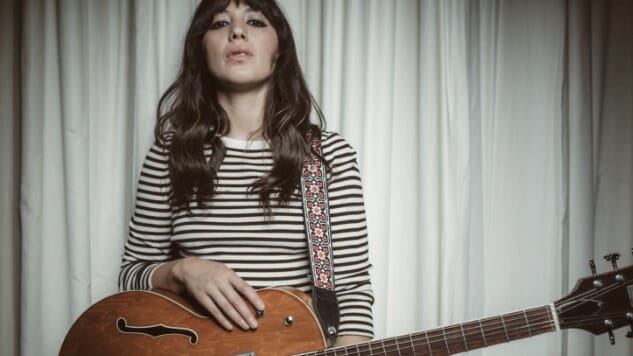After Years of Record-Label Limbo, Michelle Branch Can Tell You That She’s Happy Now

Sometimes when Michelle Branch goes out for coffee, the barista recognizes the name on her credit card. Assuming that said server was alive and watching MTV or VH1 in the early aughts, they’ll almost certainly ask Branch what she’s been up to since the release of her platinum-selling 2003 sophomore record, Hotel Paper, which is home to rotation-heavy singles like “Are You Happy Now?” and “Breathe.”
The singer-songwriter, 33, is accustomed to this type of well-intentioned third degree; if every career decision had been hers, she explains over tea at the Bowery Hotel in New York, she’d have put out additional solo work a long time ago. Instead, it’s 14 years later, and she’s at last able to release her long-awaited third record, Hopeless Romantic (out on April 7 via Verve).
So, to echo her fans and the occasional server, what was the hold up? Well, with the exception of her time spent in country-pop duo The Wreckers from 2005 to 2007, much of the time between Hotel Paper and now has consisted of a seemingly endless cycle of promotional fits and starts, personnel changes at Warner Brothers (which put out her 2001 commercially lauded debut, The Spirit Room and its aforementioned follow-up), and the fact that, after every setback, her label still refused to drop her.
“There was too much money to be made off of me,” she says matter-of-factly. “It wasn’t personal. I had relationships with people who are still my friends [at Warner]. [We’d] rally the troops and get the right team and everyone would be excited and we would move forward and suddenly it’s like, “Oh, somebody bought Warner Brothers and this guy’s fired and this guy’s going and this new person’s coming in. And as you’re waiting for a new president to come in, he’s gonna make his new hires and he’s going to do some firing. And every time a new person would come in, they’d be like, ‘Well, these recordings are old, maybe you should go in the studio, start writing again.’”
Understandably, the extent to which Branch felt caught in a major-label web caused her to start questioning the very quality of her work. “At the end of the day, you start thinking, ‘I’m the common denominator. Maybe none of this is good enough.’ It was a complete mindfuck.”
Despite the red tape and vault-locked recordings (she came close to releasing an album called West Coast Time in 2011), Branch has managed to keep busy. She says that she’s played a selection of private acoustic shows; she’s “worked on a food show with a friend,” she spends time with her 11-year-old daughter, Owen. And throughout all of this, Branch has always been recording, forever optimistic that her solo music would see daylight.
Finally, more than a decade after the release of Hotel Paper, she got her chance. In the summer of 2014, a few months before finalizing her divorce from ex-husband Teddy Landau, Warner did drop Branch. The following winter, she bumped into The Black Keys drummer Patrick Carney at a Grammy party. Like everyone else, he immediately asked where she’d been. “He was sitting in the corner and everyone was doing their whole obnoxious L.A. party thing,” she says. “I kind of walked in not knowing anyone, and he was like, ‘Michelle? What’s going on? Why haven’t you put out an album?’
“The thing about Pat is that he’s a sucker for the underdog,” she continues. “I told him about being stuck at Warner Brothers and not having music out, and in his mind it was as if I had dropped a puzzle in front of him. It was like, ‘Okay, the pieces are here, why hasn’t anyone put them together?’ We started talking about music, and I was like, ‘Listen, I’m a huge fan of yours. I don’t know if you’d ever be open to it, but I’d love to send you music and maybe you could produce?’ He was really self-deprecating and said, ‘I don’t know, are you sure you want to ask me? I might ruin it.’ And I was like, ‘No, no, I really would love your opinion.’”
Coincidentally, Branch had thought about reaching out to The Black Keys before. But (of course) her label was on the fence. “My A&R guy at the time was like, ‘Uhhhh, I don’t know if that collaboration would work. That’s kind of weird.’ And I think they reached out to Dan and not Patrick. I never heard back, so I figured they weren’t interested.”
Despite his trepidation, Carney listened to Branch’s demos, which she describes as “everything from iPhone recordings to bad, half-assed recordings with built-up tracks.” Carney saw where Branch’s mind was, and he sent back references for her to consider—bands Branch’s old label probably would’ve balked at. Bands like The Cardigans and Beach House.
-

-

-

-

-

-

-

-

-

-

-

-

-

-

-

-

-

-

-

-

-

-

-

-

-

-

-

-

-

-

-

-

-

-

-

-

-

-

-

-








































